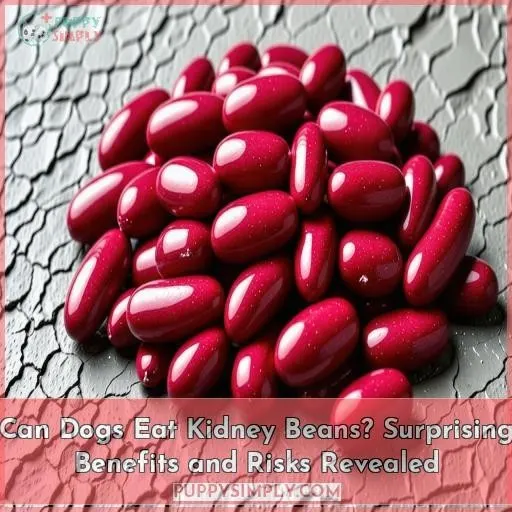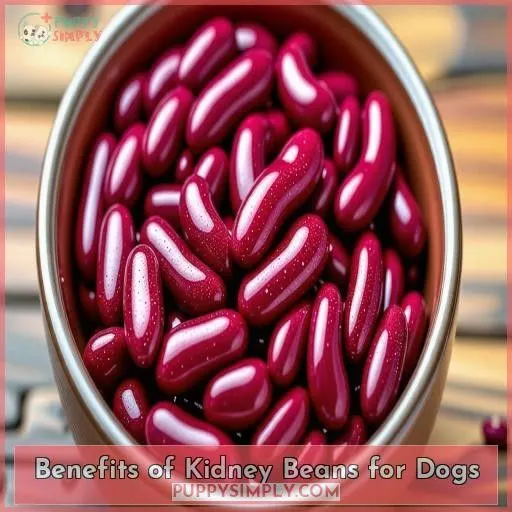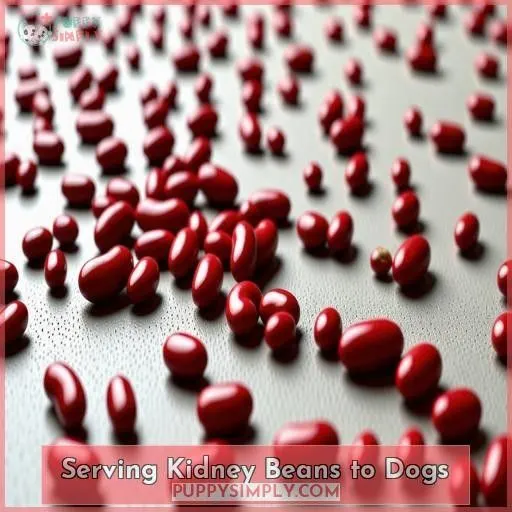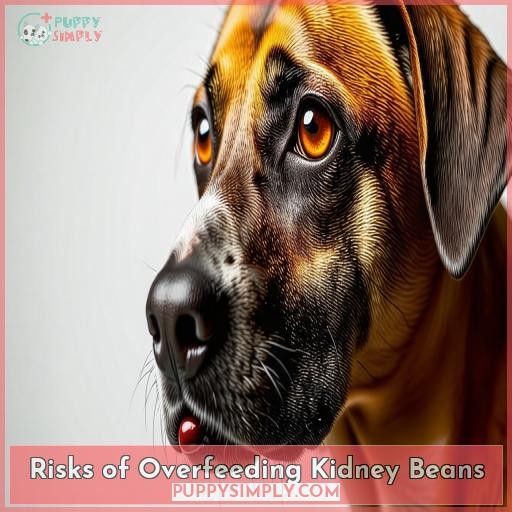This site is supported by our readers. We may earn a commission, at no cost to you, if you purchase through links.
 Yes, dogs can safely eat kidney beans in moderation! Cooked kidney beans** are packed with protein, fiber, and antioxidants that support your pup’s health.
Yes, dogs can safely eat kidney beans in moderation! Cooked kidney beans** are packed with protein, fiber, and antioxidants that support your pup’s health.
Just be sure to soak them overnight and cook thoroughly to remove any harmful lectins.
Avoid canned beans and seasonings.
Kidney beans make a great occasional treat, but don’t overdo it – too many can cause gas and bloating.
If your dog shows signs of digestive upset, stop feeding and consult your vet.
With a few precautions, you can safely share the benefits of kidney beans with your furry friend. Keep reading to learn more!
Table Of Contents
- Key Takeaways
- Can Dogs Eat Kidney Beans?
- Are Kidney Beans Safe for Dogs?
- Benefits of Kidney Beans for Dogs
- How to Prepare Kidney Beans for Dogs
- Serving Kidney Beans to Dogs
- Risks of Overfeeding Kidney Beans
- Frequently Asked Questions (FAQs)
- Can dogs eat canned kidney beans?
- What beans can dogs not eat?
- Can dogs have kidney beans and rice?
- Are canned kidney beans already cooked?
- Can dogs eat raw kidney beans?
- How much kidney beans can dogs eat?
- Are canned kidney beans safe for dogs?
- What nutrients do kidney beans provide dogs?
- Can kidney beans cause digestive issues in dogs?
- Conclusion
Key Takeaways
- Cooked kidney beans are safe for dogs when prepared properly by soaking them overnight to remove lectins and cooking them thoroughly until soft and edible.
- Kidney beans offer essential nutrients such as protein, fiber, and antioxidants, supporting digestive health, heart health, and overall wellness in dogs.
- It’s important to avoid feeding canned kidney beans to dogs due to preservatives and high sodium levels and to discontinue feeding if gastrointestinal issues occur.
- Moderation is key when it comes to feeding kidney beans to dogs; overfeeding can lead to unpleasant side effects such as gas, bloating, and digestive discomfort.
Can Dogs Eat Kidney Beans?
Yes, dogs can eat kidney beans in moderation. Kidney beans provide protein and fiber, but they should be thoroughly cooked and served plain without seasonings. Overfeeding kidney beans may cause gastrointestinal issues in dogs.
Are Kidney Beans Safe for Dogs?
Yes, kidney beans can be safely fed to dogs, but only when cooked thoroughly. Raw kidney beans contain lectins, which are toxic to dogs and can cause vomiting, diarrhea, and abdominal pain. Cooking destroys these harmful lectins, making kidney beans a healthy addition to your pup’s diet.
When preparing kidney beans for your dog, soak them overnight to remove any remaining lectins, then cook them until soft and edible. Avoid adding any seasonings or spices.
Canned kidney beans should be avoided due to their high sodium content and preservatives. If your dog experiences any gastrointestinal issues after eating kidney beans, discontinue feeding and consult your veterinarian.
Benefits of Kidney Beans for Dogs
Kidney beans offer dogs essential protein, fiber, and antioxidants to support their overall health and well-being. These nutrients aid in digestion, heart health, and provide important benefits to your canine companion.
Protein and Fiber [6
Kidney beans are a great source of protein and fiber for dogs. The protein supports muscle growth and maintenance, while the fiber promotes digestive health and regularity. Feeding kidney beans in moderation can also aid in weight loss due to their low-fat content and ability to provide a feeling of fullness.
Antioxidant Properties [7
Kidney beans are packed with antioxidants that provide powerful protection against free radicals, reducing inflammation and preventing cellular damage. These antioxidants boost your dog’s immune system, helping to ward off infections and diseases.
Studies show that the antioxidants in kidney beans may even help prevent certain types of cancer. Feeding your dog a balanced diet that includes cooked kidney beans in moderation can provide these antioxidant benefits.
Heart Health Support
Kidney beans support heart health by promoting kidney function and reducing hypertension. Their high fiber content helps lower cholesterol levels, while antioxidants neutralize free radicals that damage cells. However, moderation is key, as kidney beans contain lectins that can cause digestive issues in large amounts. Consult your vet before adding kidney beans as a dietary supplement.
How to Prepare Kidney Beans for Dogs
To prepare kidney beans for your dog, soak them overnight to remove lectins, then thoroughly cook them until soft and edible, avoiding any seasonings or spices. This process makes certain the beans are safe and suitable for your dog’s consumption.
Soak Kidney Beans Overnight to Remove Lectins
To prepare kidney beans for dogs, soak them overnight to eliminate lectin toxicity, enhancing digestive health and preventing issues like flatulence. This step guarantees safe bean consumption for your furry friend. Overnight soaking is indispensable before thoroughly cooking the kidney beans, guaranteeing they’re soft and edible for your dog’s consumption while avoiding any potential risks associated with lectin toxicity.
Cook Thoroughly Until Soft and Edible
After soaking kidney beans overnight to remove harmful lectins, it’s essential to cook them thoroughly until soft and edible. Boiling for at least 10 minutes destroys residual lectins and enhances digestibility. Cooked kidney beans provide:
- Easily digestible protein and fiber for dogs
- Antioxidants that support heart health (Source)
- Vitamins and minerals that promote overall wellness
- Improved palatability and texture for canine enjoyment
Avoid Adding Seasonings or Spices
When preparing kidney beans for your pup, avoid adding any seasonings or spices. Stick to plain, unseasoned beans for their safety and health. Overfeeding can lead to gastrointestinal issues, so feed in moderation as an occasional treat. Consider alternative cooking methods like steaming raw green beans for a crunchy snack packed with nutritional value.
| Cooking Method | Soaking Time | Serving Size |
|---|---|---|
| Boiling | 8-12 hours | 1-2 tbsp |
| Steaming | N/A | 1-2 tbsp |
| Roasting | 8-12 hours | 1 tbsp |
Serving Kidney Beans to Dogs
When serving kidney beans to dogs, remember to avoid canned kidney beans due to preservatives and sodium. If your dog experiences any gastrointestinal issues, discontinue feeding kidney beans immediately.
Avoid Canned Kidney Beans Due to Preservatives and Sodium
Steer clear of canned kidney beans for your pup. They often contain preservatives and high amounts of sodium that can cause bloating and other digestive woes. Stick to plain, cooked kidney beans without any added seasonings or spices. If you notice any tummy troubles after feeding beans, discontinue immediately and consult your vet.
Discontinue Feeding if Gastrointestinal Issues Occur
If your dog experiences gastrointestinal issues like vomiting, diarrhea, or abdominal pain after eating kidney beans, discontinue feeding immediately. Raw kidney beans contain lectins that can cause toxicity, so monitor symptoms closely. Seek veterinary care if symptoms persist or worsen. Stick to cooked kidney beans without seasonings to avoid lectin toxicity and gastrointestinal upset.
- Discontinue feeding kidney beans if GI issues occur
- Monitor for vomiting, diarrhea, abdominal pain
- Seek vet care if symptoms persist or worsen
- Stick to cooked kidney beans without seasonings
- Avoid raw kidney beans due to lectin toxicity
Risks of Overfeeding Kidney Beans
While kidney beans offer numerous health benefits for dogs, overfeeding can lead to unpleasant side effects. Excessive consumption may cause flatulence, leaving your pup and your household uncomfortable.
Bloating is another potential risk, which can be especially dangerous for dogs. To avoid these issues, it’s important to feed kidney beans in moderation as an occasional treat, not as a dietary staple.
Portion control is key – stick to the recommended serving size and gradually introduce kidney beans to your dog’s diet. If you notice any adverse reactions, discontinue feeding and consult your veterinarian.
With proper precautions and portion control, kidney beans can be a safe and nutritious addition to your dog’s diet.
Frequently Asked Questions (FAQs)
Can dogs eat canned kidney beans?
Canned kidney beans are technically safe for dogs in small amounts, but beware – they’re often packed with sodium and preservatives that can upset your pup’s tummy. Stick to plain, cooked beans for a healthier treat .
What beans can dogs not eat?
Avoid feeding your pup raw kidney beans, lima beans, broad beans, and refried beans. Cook beans thoroughly without seasonings and feed in moderation to prevent digestive issues. Consult your vet for specific dietary needs.
Can dogs have kidney beans and rice?
Absolutely, dogs can have kidney beans and rice. These wholesome ingredients provide protein, fiber, and essential nutrients in proper balance for your furry friend. Make sure thorough cooking and proper portion control to avoid any digestive issues. (Source)
Are canned kidney beans already cooked?
Canned kidney beans are already cooked, but they may contain preservatives and high sodium levels. It’s best to rinse canned beans before feeding them to your dog to reduce sodium intake .
Can dogs eat raw kidney beans?
Raw kidney beans contain a toxin called lectin that can cause vomiting, diarrhea, and abdominal pain in dogs. However, cooked kidney beans are safe in moderation and provide protein, fiber, and antioxidants .
How much kidney beans can dogs eat?
Dogs can safely eat kidney beans in moderation. Offer cooked kidney beans to avoid gastrointestinal issues. Provide small portions as part of a balanced diet. Consider individual preferences and consult a veterinarian if unsure.
Are canned kidney beans safe for dogs?
Canned kidney beans are technically safe for dogs in small amounts, but choose low-sodium varieties without preservatives. Drain, rinse, and cook them thoroughly to reduce lectins before serving as an occasional treat .
What nutrients do kidney beans provide dogs?
Kidney beans are a nutritional powerhouse for pups, packed with protein, fiber, vitamins, and minerals that support their overall health. Just be sure to cook them thoroughly to remove any toxins before serving.
Can kidney beans cause digestive issues in dogs?
Cooked kidney beans can cause gas and bloating in dogs if consumed in large quantities. Raw kidney beans contain a toxin causing digestive issues like vomiting, diarrhea, and abdominal pain. Moderation and thorough cooking are essential.
Conclusion
Certainly, kidney beans can be a nutritious addition to your dog’s diet when served in moderation. However, it’s essential to properly prepare them by soaking and cooking thoroughly to eliminate harmful lectins.
Avoid canned varieties and seasonings, and discontinue feeding if digestive issues arise.









